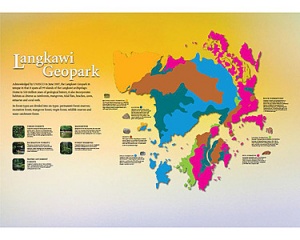Geopark discovery centre at Four Seasons Langkawi, showcases UNESCO wonders

Launching this August, the Geopark Discovery Centre at Four Seasons Resort Langkawi showcases the 550 million-year-old wonders of Southeast Asia’s first UNESCO Geopark. UNESCO Geoparks are areas that possess high geological, biological, archeological, historical and cultural values. They are recognized for their extraordinary landscapes as well as the sustainable development and conservation efforts of the communities that live within them.
Acknowledged by UNESCO in June 2007, the Langkawi Geopark is unique in that it spans all 99 islands of the Langkawi archipelago. Home to 550 million years of geological history, it boasts the region’s oldest and most spectacular rock formations alongside habitats as diverse as rainforests, mangroves, tidal flats, beaches, caves, karsts, estuaries and coral reefs.
The Geopark Discovery Centre of Four Seasons Resort Langkawi explores the Geopark’s key attributes, from the most complete Palaeozoic sedimentary sequence in Malaysia to labyrinthine mangroves, lush rainforests and unique animal and bird residents. Through a series of exhibition boards, interactive presentations and display cases, the Resort’s Naturalist, Aidi Abdullah, guides guests through Langkawi’s incredible natural environment. The Centre also inspires deeper exploration of local wonders, from the eagles, monkeys and bats that reside in the labyrinthine mangroves of the Kilim Karst Geoforest – just minutes by boat from the Resort – to coastal kayaking to a salt-water lake, linked to the sea by a 15-metre (49-foot) cave tunnel.
“We are blessed to be in the midst of one of the world’s most incredible geological and ecological environments,” explains Abdullah. “Yet so few tourists realize the extent of the nature that lies beyond Langkawi’s beaches. We hope the Geopark Centre will encourage further understanding and exploration of the Geopark, while serving as an education tool for guests and the local community. There’s a lot of mind-blowing nature out there: we just want people to know about it.”

